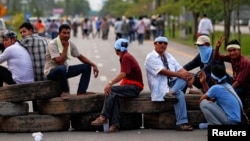BANGKOK —
Rubber farmers in Thailand on Tuesday threatened to intensify protests as the government rejected their calls for Bangkok to buy their produce at prices higher than the market value.
A group of rubber farmers, fluctuating in size between 200 and 300, were continuing to block a main road with trees and trucks after gathering on Monday in the Bang-saphan district, around 190 miles south of Bangkok, police said.
The move has, so far, not affected output or shipments from the world's biggest rubber producer and exporter. However, there are fears deliveries to the Bangkok port may be disrupted if protests escalate.
Angered by steep falls in prices, the farmers want the government to buy rubber sheet from them at 100 baht ($3.22) per kg, more than a third higher than the market price on Tuesday of 72 baht. They have snubbed a subsidy offered last month.
“If they don't buy rubber from us at 100 baht per kg, they will see [a] much bigger protest tomorrow,” said Tossapol Kwanraud, one of the protest's leaders. He declined to say how protests could be intensified.
Earlier on Tuesday, the government dismissed the protesters' demands.
“We have no plan to push up rubber prices by buying at high prices and keeping it in stocks as that would be a costly scheme that would not sustainably support farmers,” said Agriculture Minister Yukol Limlaemthong.
A senior government official claimed about 1,500 police officers were on standby in case of violence.
Weera Sriwattanatrakul, governor of the region where the protest is taking place, told reporters the government had proposed forming a committee comprising farmers, exporters and officials to work on stabilizing prices.
Although some protesters said they were interested in the suggestion, others said they would be sticking with their demands.
The price of unsmoked Thai rubber sheet has changed little from the end of 2012, held down by weak demand from China and other big consumers. It is far below the 180 baht reached in February 2011, when benchmark smoked rubber sheet (RSS3) hit a record price of $6.40 per kg on global markets.
After the drop in prices last year, the government spent $690 million buying rubber from October 2012 to May 2013, and built up stocks of 210,000 tons of rubber sheet without having much impact on prices.
Thailand produces around 3.8 million tons of rubber sheet a year, which represents around a third of the world's output, and exports 90 percent of it.
A group of rubber farmers, fluctuating in size between 200 and 300, were continuing to block a main road with trees and trucks after gathering on Monday in the Bang-saphan district, around 190 miles south of Bangkok, police said.
The move has, so far, not affected output or shipments from the world's biggest rubber producer and exporter. However, there are fears deliveries to the Bangkok port may be disrupted if protests escalate.
Angered by steep falls in prices, the farmers want the government to buy rubber sheet from them at 100 baht ($3.22) per kg, more than a third higher than the market price on Tuesday of 72 baht. They have snubbed a subsidy offered last month.
“If they don't buy rubber from us at 100 baht per kg, they will see [a] much bigger protest tomorrow,” said Tossapol Kwanraud, one of the protest's leaders. He declined to say how protests could be intensified.
Earlier on Tuesday, the government dismissed the protesters' demands.
“We have no plan to push up rubber prices by buying at high prices and keeping it in stocks as that would be a costly scheme that would not sustainably support farmers,” said Agriculture Minister Yukol Limlaemthong.
A senior government official claimed about 1,500 police officers were on standby in case of violence.
Weera Sriwattanatrakul, governor of the region where the protest is taking place, told reporters the government had proposed forming a committee comprising farmers, exporters and officials to work on stabilizing prices.
Although some protesters said they were interested in the suggestion, others said they would be sticking with their demands.
The price of unsmoked Thai rubber sheet has changed little from the end of 2012, held down by weak demand from China and other big consumers. It is far below the 180 baht reached in February 2011, when benchmark smoked rubber sheet (RSS3) hit a record price of $6.40 per kg on global markets.
After the drop in prices last year, the government spent $690 million buying rubber from October 2012 to May 2013, and built up stocks of 210,000 tons of rubber sheet without having much impact on prices.
Thailand produces around 3.8 million tons of rubber sheet a year, which represents around a third of the world's output, and exports 90 percent of it.





